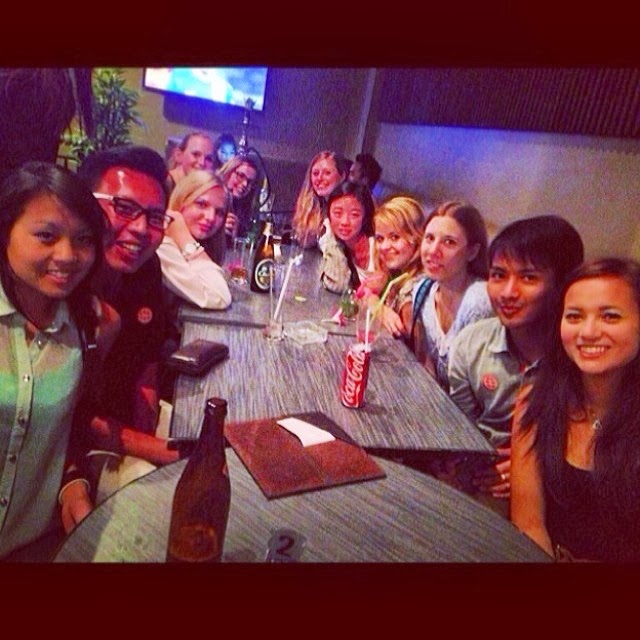Although called the Study Week, where
students are given some time off to have individual/group study to prepare for
exams, many of them take this opportunity to travel instead! Our fellow Grand
Tour student, Joshua is also going on an adventure to visit the popular tourism
destinations (and see cabaret live show) in Thailand.
The Irony of Study Week
Study Week? At first, it
REALLY sounds boring and probably as terrifying as when you hear the word “Exam
Week”. Contrary to what you may initially expect, for me (as a Stenden
student), we always wait for this week to come soon and embrace it cheerfully
in every term/Module J. Why so? Because this
week is my “Study Week”, in other words, a one-week off from Rangsit
University. Of course, all of us, the Grand Tour students, make use of this
opportunity to travel to different parts of Thailand. Island hopping is
probably what most Grand Tour students do starting from Koh Pha Ngan for its
famous full moon party held once every month to Koh Phi Phi where one of
DiCaprio’s movie in 2000 called The Beach
was filmed.
As I have spent my entire
life in the Indonesian archipelago, I decided to spend half of my Study Week
back to my lovely home city, Jakarta! Besides staying with my family, I also
got the chance to explore a lot of hip and trendy places, such as The Cloud
Lounge & Living Room, a rooftop bar on the 49th floor
overviewing Central Jakarta. Enough said about my trip back to Jakarta and now
let’s get back to my Thai adventure.
Located in the Andaman
Sea of southern Thailand, Phuket is an island as well as a province with
tourism as its main income. As I began to disembark from the aircraft, I was
welcomed by a long queue in the Immigration at Phuket International Airport. In
addition, the mid-day heat took me by surprise as I stepped out of the
building. Even so, I would say that my short, weekend getaway to Phuket Island
was worthwhile.
I stayed at Phuket’s
equivalent to Kuta Beach called
Patong, and I must confess that this island is breathtakingly beautiful.
Considering that this was a short trip, my friend and I did not waste our time,
and thus started our endless spress of sightseeing activities.
The three highlights of
my trip are Bangla Road, Koh Phi Phi islands hopping and Simon Cabaret Show. At
the heart of Patong district, Bangla Road is the perfect place for the nocturnal
partygoers on the island. Along the road where no vehicle is allowed to pass,
there are different kinds of Thailand’s nightlife entertainment, such as
restaurants, bars, pubs, strip clubs or even “ping-pong” shows. Although I did
not stay for a long time here, my night promenade was awesome seeing the
bustling nightlife of Phuket.
I believe, Koh Phi Phi
islands hopping is a must in your agenda when visiting Phuket. An hour away by
chartered speedboat from eastern Phuket’s pier, you will be relaxed by the
breeze, azure of Andaman Sea and tropical coral reefs. Whether you would like
to snorkel, swim or just sunbath, this day excursion has something for
everyone. One spot that I enjoyed so was Maya Bay where The Beach’s shoot took place.
At last but definitely
not the least is Simon Cabaret Show. What else can you expect from a typical
Thai entertainment? Surely, a cabaret show performed by the most gorgeous,
good-looking ladyboys of Thailand, known as the otherwise transvestites of Thai.
Recommended by all Phuket’s tour operators, Simon Cabaret Show will pamper you
with an amusing dance performance from different cultures and eras for
approximately 1 hour and 15 minutes in its state-of-art theatre with great
lightings and audio. Taking picture with the ladyboy before or after the show
is also another unique experience although you are expected to give 100 Baht as
tip”. Nonetheless, I really enjoy their performances especially in terms of
their choreography and costumes.
Well, was there anything
new that I have learned from my trip to the southern part of Thailand? The
answer is Yes! Apparently, in Phuket for instance, there is a proportional
percentage of Thai Muslims in the society. This fact answers my initial doubt
when passing a number of mosques along the way from the airport to Patong area.
One of the local tour guides also told me that there is an increasing
percentage of Thai Hindu due to the influence of Indian diaspora here.
Interestingly, I met several Thai people who could speak Malay too, which I
rarely see in Bangkok. This may be due to Malaysia’s influence on the
Southernmost provinces of Thailand.
A hint for my next
writing, it is another Thailand’s Gastronomy Part 2 as I am going to feature
Asia’s No. 1 Restaurant. So, stay tuned and get back to work (and the real
studies)!






.jpg)

_enjoying_their_desserts._Yum!_I_want_to_join_you_too.jpg)
